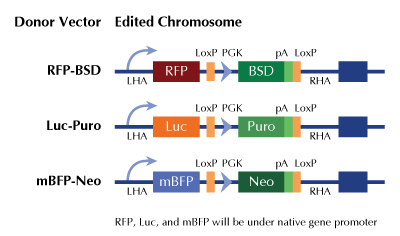Ataxin 1 (ATXN1) Human Gene Knockout Kit (CRISPR)
CAT#: KN222862BN
ATXN1 - human gene knockout kit via CRISPR, HDR mediated
HDR-mediated knockout kit validation
CNY 12,260.00
Specifications
| Product Data | |
| Format | 2 gRNA vectors, 1 mBFP-Neo donor, 1 scramble control |
| Donor DNA | mBFP-Neo |
| Symbol | Ataxin 1 |
| Locus ID | 6310 |
| Kit Components |
KN222862G1, Ataxin 1 gRNA vector 1 in pCas-Guide CRISPR vector KN222862G2, Ataxin 1 gRNA vector 2 in pCas-Guide CRISPR vector KN222862BN-D, donor DNA containing left and right homologous arms and mBFP-Neo functional cassette. GE100003, scramble sequence in pCas-Guide vector |
| Disclaimer | These products are manufactured and supplied by OriGene under license from ERS. The kit is designed based on the best knowledge of CRISPR technology. The system has been functionally validated for knocking-in the cassette downstream the native promoter. The efficiency of the knock-out varies due to the nature of the biology and the complexity of the experimental process. |
| Reference Data | |
| RefSeq | NM_000332, NM_001128164, NM_001357857, NR_152111, NR_152112, NR_152113, NR_152114, N52856 |
| Synonyms | ATX1; D6S504E; SCA1 |
| Summary | The autosomal dominant cerebellar ataxias (ADCA) are a heterogeneous group of neurodegenerative disorders characterized by progressive degeneration of the cerebellum, brain stem and spinal cord. Clinically, ADCA has been divided into three groups: ADCA types I-III. ADCAI is genetically heterogeneous, with five genetic loci, designated spinocerebellar ataxia (SCA) 1, 2, 3, 4 and 6, being assigned to five different chromosomes. ADCAII, which always presents with retinal degeneration (SCA7), and ADCAIII often referred to as the `pure' cerebellar syndrome (SCA5), are most likely homogeneous disorders. Several SCA genes have been cloned and shown to contain CAG repeats in their coding regions. ADCA is caused by the expansion of the CAG repeats, producing an elongated polyglutamine tract in the corresponding protein. The expanded repeats are variable in size and unstable, usually increasing in size when transmitted to successive generations. The function of the ataxins is not known. This locus has been mapped to chromosome 6, and it has been determined that the diseased allele contains 40-83 CAG repeats, compared to 6-39 in the normal allele, and is associated with spinocerebellar ataxia type 1 (SCA1). Alternative splicing results in multiple transcript variants, with one variant encoding multiple distinct proteins, ATXN1 and Alt-ATXN1, due to the use of overlapping alternate reading frames. [provided by RefSeq, Nov 2017] |
Documents
| Product Manuals |
| FAQs |
Resources
| 基因表达相关资源 |
Other Versions
| SKU | Description | Size | Price |
|---|---|---|---|
| KN222862 | ATXN1 - human gene knockout kit via CRISPR, HDR mediated |
CNY 12,260.00 |
|
| KN222862LP | ATXN1 - human gene knockout kit via CRISPR, HDR mediated |
CNY 12,260.00 |
|
| KN222862RB | ATXN1 - human gene knockout kit via CRISPR, HDR mediated |
CNY 12,260.00 |
|
| KN422862 | ATXN1 - KN2.0, Human gene knockout kit via CRISPR, non-homology mediated. |
CNY 8,680.00 |
|
| GA104282 | ATXN1 CRISPRa kit - CRISPR gene activation of human ataxin 1 |
CNY 12,255.00 |
其它Ataxin 1产品


 United States
United States
 Germany
Germany
 Japan
Japan
 United Kingdom
United Kingdom
 China
China

